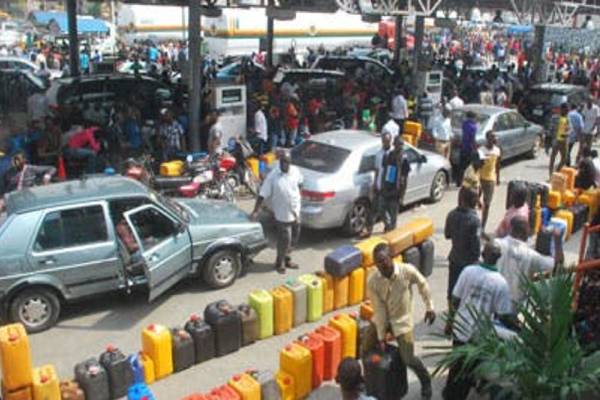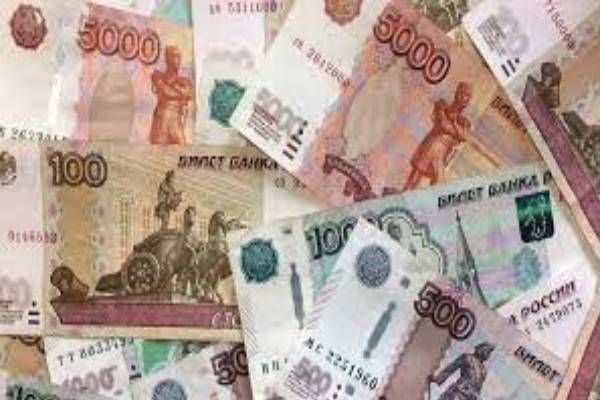The ongoing conflict between Russia and Ukraine may extend the nearly three-week scarcity of Premium Motor Spirit, also known as petrol, in Nigeria, as the majority of refined products entering the country from the warring zone and its bordering areas are expected to be delayed.
On Sunday, it was also reported that traders supplying Nigeria with refined petroleum products may take a break due to a shortage of crude oil cargoes from the Nigerian National Petroleum Company Limited.
Through its Direct Sale Direct Purchase scheme, the NNPC imports refined fuel into Nigeria through contractors or traders.
The oil corporation sends crude oil to its trading partners, who then supply the NNPC with refined goods equal to the level of crude received by the national oil company, according to the arrangement.
However, reliable sources within the oil company and among traders said on Sunday that due to low oil output, Nigeria’s DSDP commitment was around 17 cargoes short.
They claimed that unless something radical was done, such as complete deregulation of the downstream oil sector, the gasoline scarcity issue in the United States would worsen.
They also stated that the Russia-Ukraine conflict could exacerbate the petrol supply problem in Nigeria by preventing products from leaving refineries in the region on time.
Nigeria now imports refined petroleum products due to the fact that its refineries remain idle.
“What we face now could be described as a perfect storm, which is when many things go wrong at the same time. We have a fundamental problem, but that problem happens at a time that other things happened and so it aggravates everything,” an oil trader with the NNPC, who pleaded not to be named due to the sensitive nature of the matter, stated.
The source added, “Now, Russia has attacked Ukraine. What is the impact of Russia’s attack of Ukraine on Nigeria? Russia is an oil-producing country, for Ukraine, our refined products come from that part of the world, not only Western Europe.
“So, the price has gone up because our refined products come from that part of the world and disturbances such as the one happening there will impact supply one way or the other.”
Meanwhile, the cost of transporting crude oil on super-sized tankers from the Gulf Coast of the United States to the United Kingdom and Asia has risen as a result of attacks on ships in the Black Sea, which have imposed a risk-based premium on global shipping markets.
Shipowners were already avoiding lending their ships to collect oil from Russia, despite the fact that at least three merchant ships had reportedly been struck since Russian military launched an attack on its neighbor last week.
Insurers either refuse to cover ships heading into the Black Sea or charge exorbitant charges for doing so.
Meanwhile, new evidence suggests that the trend has spread throughout Africa, especially Nigeria.
A former President of the Nigerian Indigenous Ship-Owners Association, Aminu Umar, confirmed it was now difficult for ships to sail through the Russia-Ukraine region and its adjoining areas due to the escalating tensions, noting that the area had since been classified as a war zone.
According to him, the situation may lead to a shortage of vessels as more ships avoid the regions.
“Some steel imports come from the Black Sea. Due to insecurity and war in Ukraine which you know is in the Black Sea, it is going to be difficult for ships to go there. The insurance world has classified the area as a war zone. So, many ships cannot go there anymore. No ship is allowed to go there until things are cleared, unless the owner of the vessel decides to take the risk directly, going without following advice from his insurance firm.”
As a result of the development, the expert said the situation had led to a major increase in freight rate.
Umar said, “There may be a shortage in the number of vessels going to the Black Sea to ferry cargoes to Nigeria. Already, freight has skyrocketed in the Black Sea and the Mediterranean Sea. These are places we get cargoes that come to Nigeria. The development is going to affect the shipping world very significantly.
“Again, some vessels are already currently blocked in the Black Sea, they can’t come out. Also, some are going to face embargos and sanctions, which means they can’t trade in cargo. Any shipping company owned by a Russian or flying the Russian flag will be involved in this sanction. Consequently, a number of the vessels trading within the Black Sea and the Mediterranean will end not being able to carry cargo either to Europe, America or any of the African countries, because Nigeria is also following the United Nations sanction.”
Specifically, he said the freight rate on tanker vessels had gone up from $10,000 per day to $30, 000 per day, a few days into the war.
In addition, Tajudeen Alao, President of the Nigerian Association of Master Mariners, said that crude oil prices had surpassed $100 per barrel, and that the Russia-Ukraine conflict had resulted in an increase in insurance and freight.
“War risk insurance on freight,” he said, “increases in commodity prices such as wheat and energy in the European market.” The multiplier effect has an impact on exports to third-world countries. Extra fees will also be implemented. “War zones will be less appealing to ship owners and crews.”





